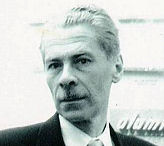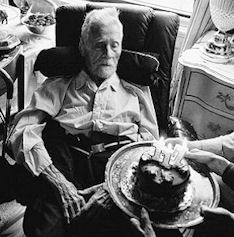Alexander Imich z"l
- in 2014, the oldest man in the world
A lexander Imich was born in Częstochowa on 4th February 1903 into a secular family. His father, who owned a decorating business, installed an airstrip for early aviators. “At the time, flying was a demonstration,” he recalls. “It attracted people for the show.” He called “the aeroplane” the greatest invention of his lifetime. He also remembers Częstochowa’s first automobiles.
lexander Imich was born in Częstochowa on 4th February 1903 into a secular family. His father, who owned a decorating business, installed an airstrip for early aviators. “At the time, flying was a demonstration,” he recalls. “It attracted people for the show.” He called “the aeroplane” the greatest invention of his lifetime. He also remembers Częstochowa’s first automobiles.
He sought to become a captain in the Polish Navy, but as a Jew was told to forget it. “I decided to become a zoologist and travel to exotic countries in Africa,” Alexander recalled. But blocked from advancement, he switched to chemistry, earning a doctorate at Jagiellonian University in Kraków.
On 4th May 1921, he sat for his written matriculation examinations at the Sienkiewicz school, and then, on 5th June 1921 sat for his oral examinations.
In the early 1930’s, Alexander Imich grew fascinated with a Polish medium who was known as “Matylda S.”, a doctor’s widow gaining renown for séances that reportedly called up the dead. He participated in numerous inexplicable encounters that he detailed in a German scholarly journal in 1932 and recounted in an anthology he edited, “Incredible Tales of the Paranormal”, published by Bramble Books in 1995 (at the age of 95!!).
He keeps a box of forks and spoons twisted in macropsychokinesis experiments. “I watched ordinary people doing that,” he said, although he himself was unable to duplicate it.
He married a childhood sweetheart who, a few years later, left him for another man. He then married her friend, Wela. When the Nazis overran Poland in 1939, they fled east to Soviet-occupied Białystok. Refusing to accept Soviet nationality, they were shipped off to a labour camp.
With Russia reeling under German attack, they were freed and moved to Samarkand, in what is now Uzbekistan, and then back to Poland. There they found that many family members had died in the Holocaust. In 1951, they immigrated to Waterbury, Connecticut.
Wela Imich, a painter and psychotherapist, opened a practice in Manhattan. After she died in 1986, Alexander moved into her suite in a pre-War apartment hotel in Manhattan. Eight years later, it was turned into a luxury seniors residence and he was “grandfathered” in. His savings vanished in dubious investments and The New York Times Neediest Cases campaign came to his aid in 2007.
 He and his wife never had children. (His closest relative is an 84-year-old nephew.)
He and his wife never had children. (His closest relative is an 84-year-old nephew.)
So what are his secrets of longevity? Did his many hardships prolong his life? “It’s hard to say.” He credited “good genes” and athletics. “I was a gymnast,” he said. “Good runner, a good springer. Good javelin, and I was a good swimmer.” He used to smoke, but gave it up long ago. Alcohol? Never, he said.
He always ate sparingly, inspired by Eastern mystics who disdain food. “There are some people in India who do not eat,” he said admiringly. Now, his home-care aides said that he fancies matzo balls, gefilte fish, chicken noodle soup, Ritz crackers, scrambled eggs, chocolate and ice cream.
(Alexander Imich passed away on Sunday 8th June 2014. He held the title of the world’s oldest man, albeit sadly, for only a short time.)
Sources:
The New York Times
and
Częstochowa biuletyn informacji publicznej.
